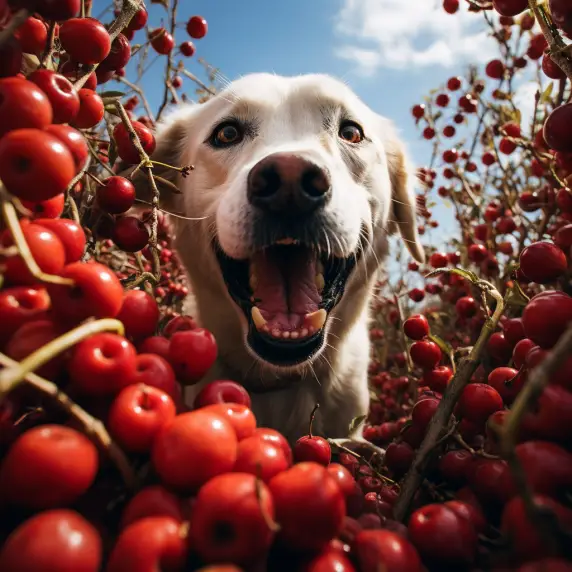Can Dogs Eat Goji Berries? What You Need to Know
It’s often said that variety is the spice of life, and many dog owners love to share their varied diets with their furry friends. But when it comes to introducing new foods into your dog’s diet, it’s always important to do some research first.
One such food that’s gained popularity in recent years is the goji berry, a small fruit packed with nutrients. So naturally, the question arises: Can Dogs Eat Goji Berries?
Let’s explore this topic in detail.
Key Takeaways & Short Answer:
Here are the quick, need-to-know points about dogs and goji berries:
- Short Answer: Yes, dogs can eat goji berries, but moderation is key. The berries are non-toxic and can offer some health benefits but should not constitute a significant portion of your dog’s diet.
- Goji berries are packed with vitamins and antioxidants which can benefit your dog’s overall health.
- Despite the health benefits, too many goji berries can lead to digestive upset in dogs. Hence, they should be given sparingly and not as a daily treat.
- Always introduce any new food, including goji berries, slowly into your dog’s diet and monitor them for any adverse reactions.
- Dogs can safely consume both dried and fresh goji berries, but it’s better to serve them dried as fresh berries might not be readily available, and dried goji berries have a longer shelf life.
- While goji berries are safe, not all berries are safe for dogs. Always research before introducing new berries to your dog’s diet.
Goji Berries: What are They?
Goji berries, also known as wolfberries, originate from Asia and have been utilized in traditional Chinese medicine for centuries. They’re small, red, sweet-tasting berries that pack a hefty nutritional punch. These berries are usually found in a dried form, similar to raisins, although they can also be found fresh.
One of the reasons goji berries have been touted as a superfood is their high nutritional content. They’re packed with vitamins A and C, and they’re also a good source of dietary fiber. Furthermore, they contain high levels of antioxidants like zeaxanthin, which contribute to their vibrant color and can promote eye health.
In addition to these benefits, goji berries are low in calories and high in protein compared to other fruits. They also have over 20 different vitamins and minerals, making them an excellent addition to a balanced diet.
These nutrients contribute to the general well-being of both humans and canines, provided they’re consumed in moderation.
Nutritional Value of Goji Berries for Dogs
When it comes to our four-legged friends, the question isn’t merely “Can dogs eat goji berries?“, but “Should they?“. To answer this, let’s dive into the nutritional profile of these berries from a canine perspective.
Goji berries, as previously mentioned, are packed with nutrients that could be beneficial for dogs. They have high levels of vitamin A, which is essential for maintaining healthy skin, coat, muscles, and nerves in dogs.
Moreover, vitamin C, another abundant nutrient in goji berries, can aid in boosting the immune system of dogs and is especially beneficial for senior dogs.
Goji berries also contain dietary fiber, which can help regulate the digestive system and bowel movements in dogs. This can be particularly beneficial for dogs suffering from constipation or other digestive issues.
Another crucial nutrient present in goji berries is antioxidants, such as zeaxanthin and lutein, which can help to fend off harmful free radicals, support the immune system, and promote eye health in dogs.
However, it’s worth noting that while goji berries can provide these nutritional benefits, they are not a complete source of nutrition for dogs and should never replace a balanced, species-appropriate diet. Instead, they should be seen as a complementary addition to your dog’s diet, given in moderation.
Can Dogs Eat Goji Berries?

So, the burning question: Can dogs eat goji berries? The answer is a resounding, yes. Dogs can eat goji berries. However, as is the case with all treats, moderation is key.
Goji berries are non-toxic to dogs and can make a healthy addition to your pet’s diet. They are high in antioxidants, vitamins, and fiber, which can contribute to your dog’s overall well-being when fed in the right quantities. However, these berries are quite rich, and too many might lead to an upset stomach or diarrhea.
Moreover, due to their small size, goji berries can pose a choking hazard, especially for small dogs. So, ensure you are present while your dog is enjoying this treat, and consider cutting the berries into smaller pieces for smaller dogs.
Finally, remember that goji berries are no substitute for a balanced dog diet. They should be served as an occasional treat and not as a meal replacement. Always consult your veterinarian before introducing any new food, including goji berries, into your dog’s diet.
They will be able to give you personalized advice based on your dog’s breed, age, size, and health status.
How Much Goji Berries Can I Give My Dog?
When introducing goji berries to your dog’s diet, the key is moderation. Despite their numerous health benefits, an excess of these berries can lead to digestive issues in dogs, including diarrhea and upset stomach. As a rule of thumb, treats, including goji berries, should make up no more than 10% of your dog’s daily caloric intake.
To start, you might want to give your dog just one or two berries and monitor for any adverse reactions. Remember to remove any seeds from the berries, as they can pose a choking risk, especially in smaller dogs. If your pet shows no signs of discomfort or allergic reaction, you can slowly increase the number to a handful, spread out over the week.
However, these recommendations can vary depending on your dog’s size, breed, age, and overall health condition. Therefore, it is always best to consult with a veterinarian before introducing new foods into your pet’s diet.
Benefits of Goji Berries for Dogs
Goji berries are known for their powerful antioxidant properties, and these benefits can be extended to our furry friends too. Here are a few reasons why goji berries can be beneficial for dogs:
- Rich in Antioxidants: Antioxidants are crucial in maintaining a healthy immune system. They help combat free radicals, unstable molecules that can cause damage to your dog’s cells. Goji berries are packed with antioxidants, which can contribute to your dog’s overall health.
- High in Vitamins: Goji berries are an excellent source of vitamin A and vitamin C. Vitamin A is vital for maintaining good vision, growth, and immune function in dogs. Vitamin C can be beneficial for older dogs or those under stress, as it helps boost the immune system.
- Good Source of Fiber: Like in humans, dietary fiber can help maintain a healthy digestive system in dogs. It aids in regular bowel movements and helps maintain a healthy weight by making dogs feel fuller for longer.
- Contains Beneficial Minerals: Goji berries are a great source of minerals like iron, zinc, and selenium. Iron helps carry oxygen to the cells, zinc aids in skin health and immune function, and selenium works with vitamin E to protect cells from damage.
- May Improve Eye Health: Goji berries contain zeaxanthin, an antioxidant known for its potential benefits to eye health. Although more research is needed in this area, some studies suggest that zeaxanthin may help protect against age-related eye diseases.
Remember, while goji berries can offer health benefits, they should not replace a balanced, complete diet for your dog. Always ensure your dog’s primary nutrition comes from high-quality dog food that meets all their nutritional needs.
If you’re thinking about introducing goji berries into your dog’s diet, it’s best to consult with your vet to determine the appropriate amount.
Risks of Goji Berries for Dogs
Just like any other food, goji berries can present certain risks for dogs when consumed in excess. Let’s delve into some of the potential risks:
- Choking Hazard: Goji berries, especially when dried, can be a choking hazard for small dogs or dogs that tend to gulp their food down without chewing.
- Upset Stomach: Despite their beneficial properties, goji berries can cause an upset stomach in dogs, especially if they are not used to them. They can cause diarrhea or vomiting if eaten in large quantities.
- Allergic Reactions: Some dogs may be allergic to goji berries. Symptoms of allergies can range from mild (such as itching or skin redness) to severe (like difficulty breathing). If you notice any unusual behavior after feeding your dog Goji berries, contact your vet immediately.
- Interaction with Medication: Goji berries have been known to interact with certain medications, such as blood thinners. If your dog is on medication, it’s always best to consult with your vet before introducing new foods to their diet.
- High Sugar Content: Goji berries, while nutritious, are high in sugar. This can be problematic for dogs with diabetes or dogs prone to obesity.
These potential risks don’t mean that goji berries are harmful to all dogs. Many dogs enjoy goji berries without experiencing any side effects. However, it’s essential to be aware of these risks and to always introduce new foods to your dog’s diet slowly and in moderation.
Consult with your vet if you have any concerns.
How to Introduce Goji Berries to Your Dog’s Diet
Introducing a new food into your dog’s diet, including goji berries, should be done gradually and with caution. Here are the steps you can follow:
- Start Small: Begin by giving your dog a small number of goji berries to see how they react. This can be just a single berry or a small piece of one if you have a smaller breed.
- Monitor for Reactions: Keep a close eye on your dog after they’ve eaten the goji berry. Look out for any signs of an allergic reaction, such as itching, excessive licking, or any changes in their behavior or stool.
- Gradually Increase the Quantity: If your dog doesn’t show any adverse reactions after a day or two, you can slowly increase the number of goji berries in their diet.
- Mix it With Their Regular Food: To make it more appealing and easy to eat, you can mix the goji berries with your dog’s regular food.
- Avoid Overfeeding: Even if your dog seems to enjoy goji berries, these should not constitute more than 10% of their daily caloric intake. Fruits are meant to be a treat or supplement, not a substitute for their balanced, regular diet.
Remember, every dog is unique and can react differently to new foods. If you notice any negative reactions or have any doubts, it’s best to consult with a veterinarian. They can provide guidance based on your dog’s specific needs and health conditions.
Other Foods Dogs Can Eat: Exploring Red Dates, Cranberries, Walnuts, Granola, Chia Seeds, and Almonds

There are many foods that humans enjoy that can also be shared with our furry friends. It’s important, however, to understand which foods are safe and how to introduce them into your dog’s diet.
Red Dates: Also known as jujubes, red dates can be a healthy treat for dogs when offered in moderation. They’re rich in vitamins and fiber. However, the pits of red dates can be a choking hazard and should always be removed before feeding them to your dog.
Cranberries: Dogs can safely eat cranberries, both raw and cooked. They offer a wealth of antioxidants and nutrients, but be mindful that the tart flavor might not be enjoyable for all dogs.
Walnuts: While not toxic, walnuts can be hard for dogs to digest and can lead to gastrointestinal upset. Also, moldy walnuts can contain a toxin that is harmful to dogs. It’s best to skip walnuts and opt for more dog-friendly nuts, like peanuts or cashews, which should also be given in moderation.
Granola: Granola often contains a lot of added sugars, which is not healthy for dogs. Additionally, if it includes raisins, chocolate, or certain types of nuts, it could be dangerous. If you’re keen on feeding your dog granola, ensure it’s a dog-friendly version with no harmful ingredients.
Chia Seeds: Chia seeds are safe for dogs and are packed with nutrients like omega-3 fatty acids and fiber. They can be added to your dog’s food as a supplement, but remember that they absorb water and can expand, so it’s important to give them in moderation.
Almonds: Almonds aren’t toxic to dogs, but they are not easily digested and can cause an upset stomach or an intestinal obstruction. It’s recommended to avoid giving your dog almonds.
In all cases, it’s vital to introduce any new foods into your dog’s diet gradually and keep a watchful eye for any adverse reactions. Always consult your vet if you’re unsure about feeding your dog a new food item.
Case Study: Real-life Experiences of Dogs Eating Goji Berries
To understand the impact of goji berries on dogs better, let’s delve into some real-life experiences from pet owners who have fed their dogs these berries.
Case Study 1: Bella the Beagle
Bella’s owner, Sarah, decided to introduce goji berries into Bella’s diet after learning about their nutritional benefits. Sarah started by giving Bella a small quantity of dried goji berries, mixed into her regular dog food. Bella seemed to enjoy the new addition to her meal.
Over time, Sarah increased the amount slightly but kept it at a level that was safe and healthy for Bella. Bella experienced improved coat health and increased energy levels, which Sarah attributes to the antioxidants and other nutrients present in goji berries.
Case Study 2: Rocky the Rottweiler
Rocky’s owner, James, tried giving his dog Goji berries after a friend recommended them. He offered a small handful of berries to Rocky as a treat. However, Rocky wasn’t too fond of the taste and left the berries untouched. James decided not to force Rocky to eat them, understanding that not all dogs may like the flavor of goji berries.
Case Study 3: Daisy the Dachshund
Daisy is a small, active dog who enjoys a diverse diet. Her owner, Emily, introduced goji berries into Daisy’s diet slowly and noticed a positive change in Daisy’s energy levels. However, Emily was careful to monitor the number of goji berries she was feeding Daisy, given Daisy’s small size.
Each of these experiences emphasizes the importance of individual reactions to goji berries in dogs. While some dogs may enjoy the taste and reap the health benefits, others may not like them at all. As always, moderation is key, and it’s essential to consult with your vet before introducing any new food to your dog’s diet.
The Veterinary Perspective: Goji Berries for Dogs
When it comes to the question, ‘Can dogs eat goji berries?‘, a veterinary perspective is crucial to consider.
Veterinarians acknowledge that goji berries, like many fruits and vegetables, can provide certain nutritional benefits to dogs. They contain beneficial antioxidants, vitamins, and minerals that can support a dog’s health when incorporated appropriately into their diet.
However, vets also emphasize caution. While goji berries are not toxic to dogs, they should only be given in moderation. The high fiber content, while beneficial in small amounts, can lead to gastrointestinal issues like diarrhea or bloating if consumed in large quantities.
Moreover, as with any new food, it’s important to introduce goji berries slowly into your dog’s diet and observe any changes or reactions. Some dogs might have individual food sensitivities or allergies that could cause adverse reactions.
When it comes to feeding your dog treats or snacks, vets remind pet owners that these should not constitute more than 10% of the dog’s daily caloric intake.
Veterinarians also recommend consulting with them before introducing any new food to your dog’s diet, including goji berries. Each dog is unique, and what works well for one may not necessarily be suitable for another.
Overall, while goji berries can be a healthy snack for some dogs, it’s important to approach their introduction thoughtfully and responsibly, keeping your dog’s overall health and well-being at the forefront.
Related:
Frequently Asked Questions
Are goji berries safe for all dog breeds?
Goji berries are generally safe for all dog breeds. However, each dog is unique and may react differently to different foods. Always monitor your dog when introducing any new food into their diet.
Can puppies eat goji berries?
Puppies can technically eat goji berries, but they are best introduced into a dog’s diet when they are adults. Puppies have different nutritional needs and introducing too many new foods can upset their stomach.
Can dogs eat dried goji berries?
Yes, dogs can eat dried goji berries. However, they should be given in moderation and rehydrated to prevent choking.
Can dogs drink goji berry juice?
It’s best to avoid giving your dog goji berry juice. Many store-bought juices have added sugars which can be harmful to dogs. If you want to give your dog goji berries, it’s better to feed them the actual fruit.
Is granola and oats good for dogs?
Granola and oats can be good for dogs in moderation as long as they don’t contain harmful ingredients like chocolate, raisins, or artificial sweeteners. Always check the ingredients before giving your dog granola or oats.
Can dogs have oats and honey granola?
Dogs can have oats and honey granola, but it should be given sparingly as a treat. Honey is high in sugar and can lead to obesity if given too often.
Why do dogs like granola?
Dogs may like the texture and taste of granola. However, it should only be given as a treat and not as a main part of their diet.
Can my dog have cinnamon granola?
Dogs can have a small amount of cinnamon, so cinnamon granola should be fine in moderation. However, not all dogs can tolerate cinnamon, so monitor your dog for any adverse reactions.
Are dried goji berries safe for dogs?
Dried goji berries are safe for dogs, but they should be rehydrated to prevent choking and should be given in moderation.
Are red dates OK for dogs?
Red dates, also known as jujubes, are not toxic to dogs, but they should be given sparingly. Like goji berries, they are high in sugar and fiber and can cause gastrointestinal issues if eaten in excess.
How many dates can a dog eat?
A small dog should not have more than one or two dates per day, while a larger dog can have up to three or four. Always remove the pit before giving your dog a date.
Why can’t dogs eat dates?
Dogs can technically eat dates, but they are high in sugar and can lead to obesity and dental problems if given too often.
Can dogs eat fresh Medjool dates?
Yes, dogs can eat fresh Medjool dates, but like other dates, they should be given sparingly and the pits should be removed. Monitor your dog for any adverse reactions.
Fina Thoughts
Goji berries can be a fun and nutritious treat for your canine companion. They offer a wealth of nutrients that can contribute to a dog’s overall health. However, as with all foods outside of their regular diet, it’s vital to introduce them gradually and observe your pet for any adverse reactions.
Remember, every dog is an individual, and what works for one may not work for another. Some dogs may thoroughly enjoy goji berries and have no issues, while others may not be as tolerant. Moreover, while goji berries are safe, other foods like red dates, granola, chia seeds, and certain nuts must be given with even more care due to their potential risks.
Ultimately, the question isn’t just “Can dogs eat goji berries?” but also “How can I introduce goji berries into my dog’s diet safely and responsibly?“. With the guidance of your vet and careful monitoring, you can explore this and other nutrition avenues for your pet.
At the end of the day, your dog’s health and well-being are paramount. So, while goji berries can add a sprinkle of variety and a boost of nutrition to your dog’s diet, they should never replace a balanced, species-appropriate diet. Always remember, when it comes to your dog’s diet, moderation is key, and your vet’s advice is invaluable. Happy feeding!
References
- “Can Dogs Eat Goji Berries?” – CanDogsEatIt.com
- “Can Dogs Have Goji Berries?” – DogWish.com
- “Goji Berries: Are They Safe for Dogs?” – DogTime.com
- “Human Superfoods to Share with Your Dog” – DarwinsPet.com






